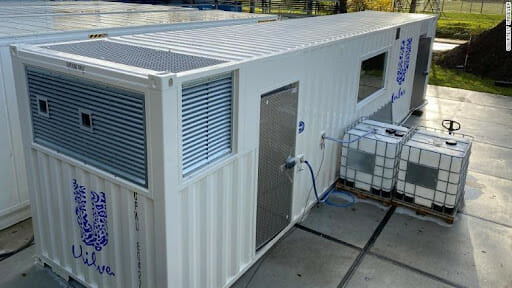The following report is from the Trends Journal:
International consumer goods conglomerate Unilever has fitted up a shipping container as a “nanofactory” to make basic consumer items such as mayonnaise and skin creams. If it works, the company will make a fleet of the traveling factories that can be quickly rigged up to test new product ideas or shipped on trucks or boats to meet a small-run local or seasonal demand.
Once it arrives at its destination, all the nanofactory needs to begin production is a source of water and a connection to electric power.
Unilever’s first nanofactory is parked in the Netherlands, where it’s turning out 300 tons of cooked bouillon every eight hours.
The container handles the whole process, from taking in raw materials to bottling the final product.
The equipment is fully digitized, with sensors sending data to a control room while three humans staff the box—two to manage the production line and one to package and remove the final products.
A portable factory that can be loaded on a ship or flatbed truck is also a nimble factory, the company points out: unique demands in specific markets could be met quickly, using locally-sourced ingredients or materials so time isn’t lost and fuel isn’t wasted shipping in supplies from far away.
In addition to having its own fleet of nanofactories, Unilever is considering selling or leasing them to others, including start-ups and entrepreneurs.
TRENDPOST: Unilever is piloting a new facet in the concept of customized mass manufacturing—one company with nanofactories spread around the world, using local ingredients to make ice cream in the summer and canned soup in the winter, for example.
Instead of consumers across the country taking what a faraway factory makes, consumers could, in effect, tell the manufacturer what to do, such as make yogurt with milk from local dairies and fruit from nearby orchards.
Ultimately, a supermarket could have its own nanofactory to make popular local or regional favorites in season.

AUTHOR COMMENTARY
It should be noted that Unilever is a sponsor and partner of the globalist COP26 conference that is beginning today. So, these new factories will be creating all kinds of these wicked inventions for this net-zero, fake meat, metaverse, garbage.
Of course, the quality will be so incredibly junk. But the philosophy will be to just make a new “___” on the spot.








No kidding. Who would want to eat the slop from these nanobeasts?
Psalm 106:29
29 Thus they provoked him to anger with their inventions: and the plague brake in upon them.
I suspect that stored food especially pre-nano
will be worth a lot of money!
(sorry my complete answer didn’t post)